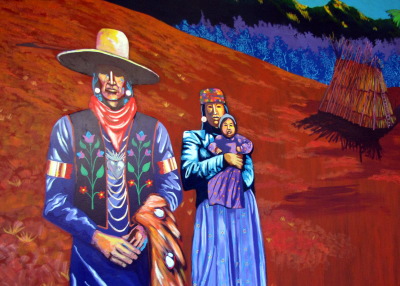Eighteen years ago today, my father left this world. He would have been 64. Since these anniversaries never seem to leave my heart, I must still have some need to observe his memory and his vision for the world. During the last ten years of his life, he worked hard to promote the traditional ways of our ancestors. He traveled all around the Pacific Northwest and learned from elders in several different Indian communities. He cooked for traditional gatherings and revived many of the old songs.
If he were alive today, I have no doubt that he would be very happy to witness our efforts to re-vitalize the Spokane language.
*
Just the other day, I was thinking about how Native languages are lost over time. Many of our elders once believed that the Indian ways were a thing of the past, so they taught their children to speak only English. In my family, my father was the first generation to learn English as his first language, meaning that I am only the second generation removed from the world of my Salish-speaking ancestors. His parents and grandparents certainly knew English as a matter of convenience or perhaps necessity, but they spoke Salish first. When I consider the 10,000 year span of history in this region, two generations do not seem like a long time.
English was also my first language, but a remnant of the old language persisted.
A scattering of Salish words punctuate the memory of my childhood. For example, some of my earliest memories revolve around asking my father for permission to do one thing or another, and he would often respond by saying, "xʷuyš!" which means, "Go!"
Other times, we followed a strange ritual around driving the car. Where ever we went, my father always sat behind the wheel, but whoever sat in the front passenger seat had the solemn responsibility to watch for cars on the right side of the vehicle. If we came to an intersection, my father would never look to the right. He only looked to the left, which I suppose he regarded as his special domain. With complete trust in the navigator, he always asked, "How is it?" The navigator would then look to the right and decide if it was safe for the car to enter the intersection. If other cars were approaching, the passenger would say, "Wait," but if the road was clear, he would say, "miš," (This means literally: "It is empty.") Upon hearing that word, my father drove forward onto the highway without pausing or making a second thought. In a way, our safety depended on that one word.
From my childhood, I also remember that my elders sometimes asked, "stem' a spuʔus," which was a way of asking, "How are you?" But it literally means, "What's on your heart?" Other words also survived, like yaya (grandmother), sileʔ (grandfather), suyepi (whiteman), or lemlmtš (thank you), but I have no idea why some persisted into our English-speaking world and why others went dormant.
A while ago, I was also wondering which of all the Salish words was the first to enter my permanent memory. I reflected on this question for several days, and I finally concluded that the earliest word from my childhood is actually my father's name: etwan. A long time ago, our Salish-speaking elders once created Indianized versions of English names - names like misel for Michael, tapit for David, malian for Mary Anne, and etwan for Edward. Some families continue this practice today.
I have virtually no clear memories of my yaya Minnie (my father's mother), but I can still see her in my mind sitting in a chair with a blanket wrapped around her shoulders. I don't remember anything else, except that she called for my father, "etwan, I'm cold. Put some wood in the fire."
*
On this day, eighteen years after my father's passing, I am somehow comforted to know that his name was the first word I can remember learning in Salish. Like a seed left over from a previous generation, that name is a source of power and the beginning of possibilities yet to come.
*
(Salish has no capitalization, so these names are written with all lower case letters).

























